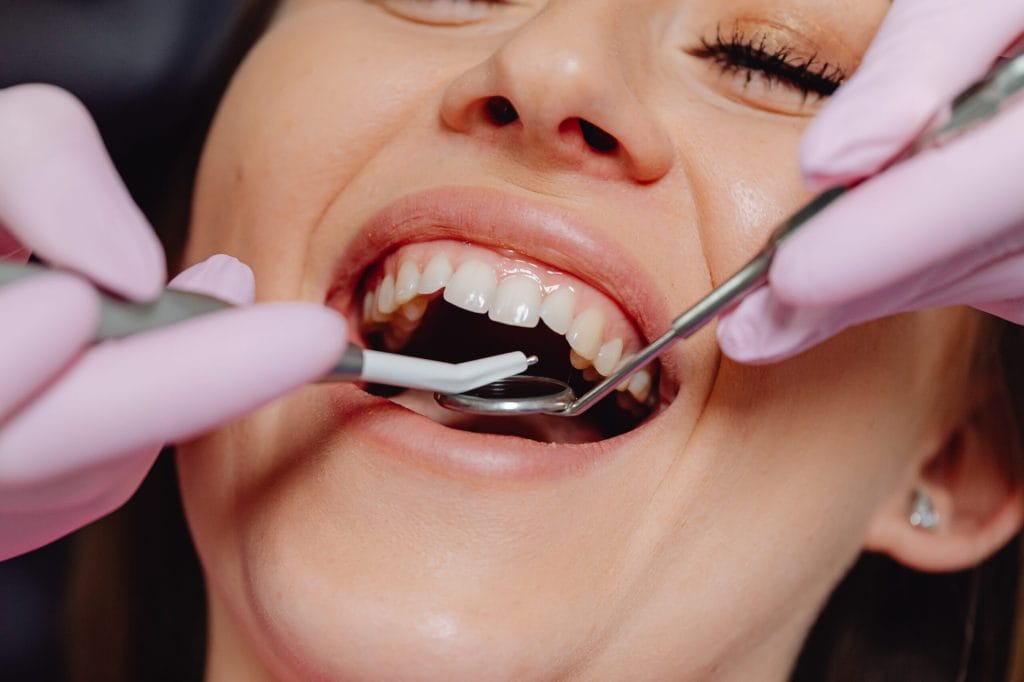Maintaining strong teeth and healthy gums goes beyond brushing and flossing. Your diet plays a crucial role in dental health, and ensuring you get the right vitamins can make a significant difference. If you’re looking for expert gum treatment, a periodontist in London can provide specialised care. Below are the top five vitamins essential for optimal oral health.
1. Vitamin D – The Calcium Absorber for Strong Teeth & Healthy Gums
Vitamin D is vital for strong teeth because it helps your body absorb calcium efficiently. Without enough Vitamin D, your teeth may become brittle, increasing the risk of decay and gum disease.
Sources of Vitamin D:
- Sunlight exposure
- Fatty fish (salmon, mackerel)
- Egg yolks
- Fortified dairy products
2. Vitamin C – The Gum Protector for Better Periodontal Health
Vitamin C is essential for maintaining gum health. It strengthens blood vessels and connective tissues, reducing the risk of gum inflammation and bleeding (gingivitis). A deficiency in Vitamin C can lead to scurvy, which severely affects oral health.
Sources of Vitamin C:
- Citrus fruits (oranges, lemons)
- Strawberries
- Bell peppers
- Leafy greens
3. Calcium – The Tooth Enforcer for Stronger Teeth
Calcium is the building block of teeth and bones. Without enough calcium, your teeth can weaken, leading to cavities and tooth loss. Visiting our gum specialist in London can help ensure you’re maintaining optimal oral health.
Sources of Calcium:
- Dairy products (milk, cheese, yoghurt)
- Almonds
- Leafy greens (kale, spinach)
- Sardines
4. Vitamin A – The Saliva Booster for Oral Protection
Vitamin A is responsible for maintaining healthy saliva production, which helps wash away bacteria and food particles, preventing plaque buildup. It also plays a role in the development of strong enamel.
Sources of Vitamin A:
- Carrots
- Sweet potatoes
- Liver
- Spinach
5. Vitamin K – The Enamel Protector for Long-Term Gum Health
Vitamin K works as a shield for your teeth by helping to block substances that break down enamel. It also supports bone metabolism, ensuring your jawbone remains strong and your teeth stay firmly in place. For expert advice, consult our London periodontist team which specialises in gum treatment.
Sources of Vitamin K:
- Leafy greens (kale, spinach, broccoli)
- Fermented foods
- Cheese
- Meat
Keep Your Gums Healthy with RW Perio
A well-balanced diet rich in these essential vitamins can significantly improve your gum health. Alongside regular dental check-ups, good oral hygiene, and a healthy lifestyle, these nutrients will keep your teeth and gums in top shape for years to come!
If you’re experiencing gum disease, receding gums, or other periodontal concerns, book a consultation with RW Perio, your trusted periodontist in London. Contact us today to take the first step towards healthier gums and a confident smile!

Many of us were taught from a young age that good oral hygiene is crucial for a healthy smile. This meant brushing your teeth twice a day or more. But is there actually such a thing as brushing your teeth too much? Surprisingly, over-brushing can do more harm than good. Read on to learn about the top 5 risks of being overzealous with your toothbrush.
Extreme tooth brushing can lead to:
1. Tooth Wear
Brushing too aggressively or too frequently can actually wear away your tooth enamel over time. This enamel is the outer protective layer of your teeth. Once enamel wears away, the next layer of the tooth called dentin gets exposed. Dentin is much softer and more porous than enamel. This means it provides less protection against external substances that can irritate the inner tooth and cause pain. Dentin contains thousands of tiny tubules leading to the inner dental pulp that register hot, cold and pressure sensitivities. Without the enamel barrier, these sensitivities are heightened.
Loss of enamel also leaves teeth prone to cavities and tooth decay. Enamel has a crystalline structure that helps prevent bacteria from adhering to teeth. Without it, bacteria can start to penetrate into micro holes in the exposed dentin, raising your risk of cavities, tooth infections and decay. According to the British Dental Association, up to 30% of adults display signs of tooth wear caused by over brushing.
2. Gum Recession
Excessive brushing can also rub away at your gums, leading to gum recession. This is when your gums gradually pull away from your teeth, exposing more tooth surface and root. Receding gum puts you at greater risk for decay and increased sensitivity. About 8% of UK adults have some form of gum recession, reports the Adult Dental Health Survey.
Find out more: Is Gum Recession Reversible?
3. Sensitivity
Worn enamel and gum recession leave microscopic cracks and openings in your teeth for hot, cold, sweet, or acidic foods and liquids to penetrate. This leads to increased sensitivity and pain when eating and drinking. To help reduce sensitivity from worn enamel and receding gums, try using a sensitivity toothpaste containing ingredients like potassium nitrate or arginine to block pain transmission. Avoiding very hot or cold foods can also help, as can getting any cavities filled quickly before they reach the nerve.
4. Damaged Tooth Roots
The roots of your teeth lie below your gum line. Brushing too forcefully near the gums can actually scrub away the root surface material. This causes increased sensitivity and can open you up to infections.
5. Loss of Tooth Structure
Repeated aggressive brushing over time can cause your teeth to become loose, thin, or grooved. This overall loss of tooth structure not only damages aesthetics but can also lead to dental issues like decay, cracking, or the need for crowns or implants.
Read about: Gum Aesthetics 101: Everything You Need to Know About Achieving a Perfect Smile
Protect Your Smile From Too Much Tooth Brushing
The good news is that by adjusting your brushing habits, you can avoid the dangers of overbrushing. Be sure to use a soft-bristled toothbrush and brush gently using small, circular motions or better still use an electric toothbrush but only hold it on the tooth rather than moving it around (let it do the work for you). Opt for brushing just twice per day for two minutes each time. And see your dentist regularly, as they can catch early signs of wear and tear.
If you think you may be overbrushing, don’t wait. Give our periodontist in London a call today to discuss your oral health. We’re here to help you achieve better brushing habits and your healthiest smile.
Maintaining healthy gums is crucial for overall oral health, but did you know that what you eat can have a significant impact on the health of your gums? Poor nutrition can lead to gum disease, which can cause gum inflammation, bleeding, and even tooth loss. On the other hand, a healthy diet can improve gum health and prevent gum disease.
Let’s explore the link between nutrition and gum health, and provide some tips on the best foods to eat and those to avoid for healthy gums.
The Link Between Nutrition and Gum Health
The nutrients that we consume play a critical role in our overall health, including the health of our gums. Nutrients like vitamin C, vitamin D, calcium, and phosphorus can all help to strengthen and maintain healthy gums. In contrast, a diet that is high in sugar and carbohydrates can lead to the growth of harmful bacteria in the mouth that can cause gum disease.
Foods to Include in Your Diet for Healthy Gums
To improve gum health, it’s essential to eat a balanced diet that is rich in nutrients that are beneficial for the gums. Some examples of foods that are beneficial for gum health include leafy greens like spinach and kale, nuts like almonds and cashews, and dairy products like cheese and milk. These foods are rich in calcium, vitamin D, and phosphorus, all of which are essential for strong teeth and healthy gums.

Your Daily Greens
Leafy greens, like spinach and kale, are some of the best foods for promoting strong teeth and healthy gums. These greens are packed with essential vitamins and minerals like calcium, magnesium, and vitamin K, which are crucial for maintaining healthy bones and teeth. Calcium is essential for building strong teeth and preventing tooth decay, while magnesium helps to absorb and utilise calcium effectively. Vitamin K is also essential for maintaining healthy gums, as it helps to prevent bleeding and inflammation.

Don’t Skip The Nuts
Nuts like almonds and cashews are another excellent choice for promoting healthy teeth and gums. Nuts are a great source of protein and healthy fats, as well as essential minerals like calcium, magnesium, and phosphorus. Calcium and phosphorus are both essential for strengthening teeth and bones, while magnesium helps to absorb and utilise calcium effectively. Additionally, the chewing motion required to eat nuts can help to stimulate the production of saliva, which can help to wash away harmful bacteria and acids from the mouth.

Strong Teeth with Dairy
Dairy products like cheese and milk are also essential for promoting strong teeth and healthy gums. Dairy products are rich in calcium, which is one of the primary building blocks of healthy teeth and bones. Additionally, dairy products like cheese and milk also contain casein, a type of protein that helps to strengthen tooth enamel and prevent tooth decay. Consuming dairy products regularly can also help to neutralise harmful acids in the mouth, which can cause tooth decay and gum disease.
Foods to Avoid for Healthy Gums
While some foods are beneficial for gum health, others can be harmful. Sugary foods and drinks, like soda and candy can cause harmful bacteria to grow in the mouth, leading to gum disease. Acidic drinks like citrus juices and sports drinks can also be harmful, as they can erode tooth enamel and lead to gum sensitivity.
When we consume sugary foods and drinks, the bacteria in our mouths feed on the sugars, producing acid as a byproduct. This acid can erode tooth enamel, leading to tooth decay and cavities. If left untreated, tooth decay can progress to the deeper layers of the tooth, leading to more severe dental problems like gum disease.
Gum disease, also known as periodontal disease, is a chronic bacterial infection that affects the tissues and bones that support the teeth. When harmful bacteria in the mouth accumulate and form plaque, it can irritate and inflame the gums, leading to gingivitis. Gingivitis is the early stage of gum disease, characterised by red, swollen, and bleeding gums.
If left untreated, gingivitis can progress to periodontitis, a more severe form of gum disease that affects the deeper tissues and bones that support the teeth. Periodontitis can lead to tooth loss, as the bone that supports the teeth is gradually destroyed by the bacterial infection.
Consuming sugary foods and drinks can also increase the risk of developing other health problems that are linked to gum disease, such as diabetes, heart disease, and stroke. This is because the inflammation and infection that occur in the gums can spread to other parts of the body, causing systemic inflammation and increasing the risk of chronic diseases.
How to Maintain Good Nutrition for Gum Health
Maintaining good nutrition for gum health is all about balance. Eating a variety of nutrient-rich foods while avoiding sugary and acidic foods is key. It’s also important to practice good oral hygiene, including brushing and flossing regularly and getting regular cleanings and check-ups. Contact our team of periodontists for a professional and specialised check-up and treatment plan to achieve healthy gums.

Start Your Periodontal Journey Today
Maintaining healthy gums starts with good nutrition. By eating a balanced diet that is rich in nutrients that are beneficial for the gums, while avoiding sugary and acidic foods, you can improve your gum health and prevent gum disease. Remember to practice good oral hygiene and visit your periodontist regularly for the best results. Let’s all make healthy dietary choices for better oral health.
According to the National Health Service (NHS), gum disease affects approximately 50% of adults in the UK, making it a prevalent oral health issue. By paying attention to our diets, we can improve our gum health and prevent gum disease, leading to a healthier and happier smile.

